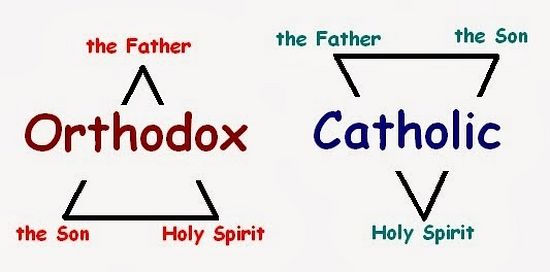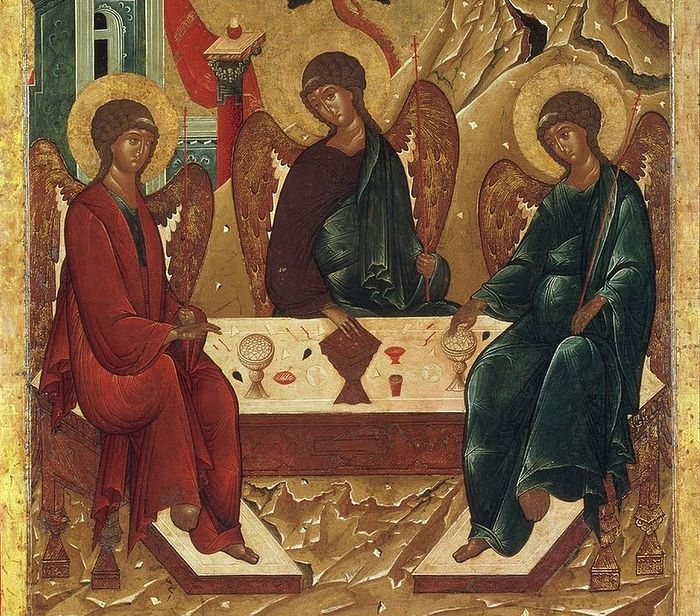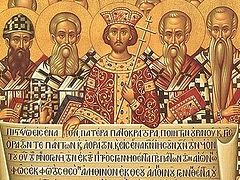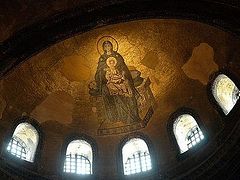Recently reviewing some old Roman Catholic dogmatic manuals and catechisms, a strange position stood out to me which I had not previously seen. I have long been familiar with Augustine’s speculations about the Trinity and the inter-Trinitarian relations based on the faulty analogy of human psychology and physiology, but as for their rising to the rank of being an official element of filioquism, I had not noticed. Naturally, Eastern Orthodox theology has officially rejected these faulty premises as leading to heresy, but exactly what kind of heresy was now made even more striking.
First, let’s consider one of the crucial forms of argument St. Athanasius uses to defend Orthodoxy against the Arian heresy that the Son was a creation. Indeed, were this so, the argument goes, the Son would be a product of the Father’s will. Were the Son a product of will, then His coming to being is not eternal, He is not the Logos, and generation is really no different from creation. All of these elements constitute the Athanasian apologetic, but consider the following from De Synodis where the Saint describes the Arian doctrine:
Blasphemies of Arius.
God Himself then, in His own nature, is ineffable by all men. Equal or like Himself He alone has none, or one in glory. And Ingenerate we call Him, because of Him who is generate by nature. We praise Him as without beginning because of Him who has a beginning. And adore Him as everlasting, because of Him who in time has come to be. The Unbegun made the Son a beginning of things originated; and advanced Him as a Son to Himself by adoption. He has nothing proper to God in proper subsistence. For He is not equal, no, nor one in essence with Him. Wise is God, for He is the teacher of Wisdom. There is full proof that God is invisible to all beings; both to things which are through the Son, and to the Son He is invisible. I will say it expressly, how by the Son is seen the Invisible; by that power by which God sees, and in His own measure, the Son endures to see the Father, as is lawful. Thus there is a Triad, not in equal glories. Not intermingling with each other are their subsistences. One more glorious than the other in their glories unto immensity. Foreign from the Son in essence is the Father, for He is without beginning. Understand that the Monad was; but the Dyad was not, before it was in existence. It follows at once that, though the Son was not, the Father was God. Hence the Son, not being (for He existed at the will of the Father), is God Only-begotten , and He is alien from either. Wisdom existed as Wisdom by the will of the Wise God. Hence He is conceived in numberless conceptions : Spirit, Power, Wisdom, God’s glory, Truth, Image, and Word. Understand that He is conceived to be Radiance and Light. One equal to the Son, the Superior is able to beget; but one more excellent, or superior, or greater, He is not able. At God’s will the Son is what and whatsoever He is. And when and since He was, from that time He has subsisted from God. He, being a strong God, praises in His degree the Superior. To speak in brief, God is ineffable to His Son. For He is to Himself what He is, that is, unspeakable. So that nothing which is called comprehensible does the Son know to speak about; for it is impossible for Him to investigate the Father, who is by Himself. For the Son does not know His own essence, For, being Son, He really existed, at the will of the Father.What argument then allows, that He who is from the Father should know His own parent by comprehension? For it is plain that for that which has a beginning to conceive how the Unbegun is, or to grasp the idea, is not possible.1
Thus, in Arianism because the definition of the Father is “ingenerate,” divine simplicity in this case mandated, for Arius, that Paternity and ousia be synonymous (as Eunomius would later say against St. Gregory of Nyssa). For another to be introduced would be impossible, as the distinctions would imply divisions and time intervals into the “ingenerate” Father-essence. For both the Arian and Eunomian, the Father-essence is a Monad wholly enclosed within itself, while along with creation, this essence has emanated a secondary creation, the “Son.” What is interesting is that St. Athanasius’ response is based on Colossians and many other texts, that the Son is the express image of the Father’s hypostasis, and this generation is from all eternity, and thus is not by will.
That generation is done by will is a lynchpin of the Arian argument and its rejection is fundamental to the Orthodox dogma that the Son is homoousios with the Father. Inasmuch as there is one will in God, and will is a property of nature, the Father, Son and Spirit all share the same natural will. This basic fact should be known and admitted by all, but a devastating problem arises when we come to the enshrined dogma of Rome concerning the so-called “double” procession of the Spirit—not only does Rome erroneously claim the Father-Son operate as a “single principle” source, the Spirit’s spiration is said to be from the will of the Father and Son.
Traditional Catholic systematic theologian Ludwig Ott explains:
“The Holy Ghost proceeds from the will or the mutual love of the Father and Son.” (Sent. certa.).
The Roman Catechism teaches that the “Holy Ghost proceeds from the Divine Will, Inflamed, as it were, with love (a divine voluntate veluti amore inflammata).”
“Holy Ghost designates a … Divine Person, the name pneuma indicates that the Holy Ghost, through an activity of the divine will, proceeds as the Principle of Divine Activity (per modum voluntatis)… the Holy Ghost proceeds as an act of love.”
“The object of the Divine Will, by which the Father and Son produce the Holy Ghost is primarily that which God necessarily loves, namely the Divine Essence, and secondarily that which He freely loves, created things…”2
The absurdity of this should immediately be evident, and to be clear the citation is the Catechism of the Council of Trent, pages 93-4. Note as well this is sententia certa, the silly level of classification which makes this a Roman proclamation of what is part of revealed theology—functioning “higher” than common, ordinary teaching. We know, of course, this doctrine arose based on the Augustinian “analogy” of human psychology. To be even clearer, this teaching is explicit in Denzinger 296 where the erroneous Western Council of Toledo interjected the filioque because of a perceived guard against Arianism, while also mandating absolute divine simplicity. This means the doctrine in question is Roman Catholic dogma, and no mere opinion:
Profession of Faith Concerning the Trinity
Let the designation of this “holy will”—although through a comparative similitude of the Trinity, where it is called memory, intelligence, and will—refer to the person of the Holy Spirit; according to this, however, what applies to itself, is predicated substantially. For the will is the Father, the will is the Son, the will is the Holy Spirit; just as God is the Father, God is the Son, God is the Holy Spirit and many other similar things, which according to substance those who live as protectors of the Catholic faith do not for any reason hesitate to say. And just as it is Catholic to say: God from God, light from light, life from life, so it is a proved assertion of true faith to say the will from the will; just as wisdom from wisdom, essence from essence, and as God the Father begot God the Son, so the Will, the Father, begot the Son, the Will. Thus, although according to essence the Father is will, the Son is will and the Holy Spirit is will, we must not however believe that there is unity according to a relative sense, since one is the Father who refers to the Son, another the Son, who refers to the Father, another the Holy Spirit who, because He proceeds from the Father and the Son, refers to the Father and the Son; not the same but one in one way, one in another, because to whom there is one being in the nature of deity, to these there is a special property in the distinction of persons.
In a confused passage, purportedly refuting Eunomius, Augustine writes of the Son, Spirit and will:
It was certainly a sharp answer that somebody gave to the heretic, who most subtly asked him whether God begot the Son willingly or unwillingly, in order that if he said unwillingly, it would follow most absurdly that God was miserable; but if willingly, he would immediately infer, as though by an invincible reason, that at which he was aiming, viz. that He was the Son, not of His nature, but of His will. But that other, with great wakefulness, demanded of him in turn, whether God the Father was God willingly or unwillingly; in order that if he answered unwillingly, that misery would follow, which to believe of God is sheer madness; and if he said willingly, it would be replied to him, Then He is God too by His own will, not by His nature. What remained, then, except that he should hold his peace, and discern that he was himself bound by his own question in an insoluble bond? But if any person in the Trinity is also to be specially called the will of God, this name, like love, is better suited to the Holy Spirit; for what else is love, except will?3
Person, will, essence and act or energy are here fused and confused as will be the perennial norm for Western theology, but I cite this to show Augustine was quite aware of the Eunomian and Arian argument that the Son was a product of the Father’s will. Though admittedly a bad argument, Augustine’s response is that if any Person in the Trinity is the will (or a product of the will?) it is the Spirit! Why? Because in this Latin tradition, in God, His actions strictly are His essence—and not only that, they are also Persons. Rather than the Orthodox formulation of love as a natural divine energy all Three have in common, here “Love” is somehow more one Person than another. Is “Justice” also a divine Person? Foreknowledge? If the Spirit is the will, and is also a product of the will, the stupidity of this error becomes manifest, as the Spirit spirates Himself. This long, crazy train of confusion is ably refuted in the famous treatise of St. Photios the Great, the Mystagogy, which can be read here.
Briefly, though, let’s look and see that this is also the teaching of Thomas Aquinas (following in the train of Augustine) in his conflated double procession argument:
“Furthermore, the order of the procession of each one agrees with this conclusion. For it was said above (I:27:4; I:28:4), that the Son proceeds by the way of the intellect as Word, and the Holy Ghost by way of the will as Love. Now love must proceed from a word. For we do not love anything unless we apprehend it by a mental conception. Hence also in this way it is manifest that the Holy Ghost proceeds from the Son.”4
Because the divine essence is the hypostasis, will and action, all predicates of God blend into classical Eunomianism. Eunomius’ modalism, as shown in the voluminous treatise of St. Gregory of Nyssa against him, was predicated on an isomorphic identification of various terms and names with the divine essence. Proclaiming to know what he did not, Eunomius, like Arius before him, foolishly imagined divine persons as products of the divine will. St. Athanasius and the rest of Orthodox theology would emphatically and dogmatically go on to reject these notions, and specifically the heresy of divine hypostases as products of the will.
Roman Catholicism, in its zeal to defend this error has merely transferred an old Arian subordinationist argument concerning the Son, to one about the Spirit! The irony here is filioquism is ignorantly touted as some response to Arianism, while foolishly making the very same argument the Arians did about the Son and applying it to the Spirit—that He is a product of will. On top of that, it is touted in their dogmatic manuals, everyday apologists and classic catechisms. To admit this to be in error is really the collapse of the entire edifice (which is already happening anyway).
In fact, in the very same work St. Athanasius rebukes speculations based on human analogies for terms like “begotten,” and explains it is not by will:
Accordingly, as in saying “offspring,” we have no human thoughts, and, though we know God to be a Father, we entertain no material ideas concerning Him, but while we listen to these illustrations and terms, we think suitably of God, for He is not as man, so in like manner, when we hear of “coessential,” we ought to transcend all sense, and, according to the Proverb, “understand by the understanding what is set before us” (Proverbs 23:1); so as to know, that not by will, but in truth, is He genuine from the Father, as Life from Fountain, and Radiance from Light. Else why should we understand “offspring” and “son,” in no corporeal way, while we conceive of “coessential” as after the manner of bodies? Especially since these terms are not here used about different subjects, but of whom ‘offspring’ is predicated, of Him is “coessential” also.5
The Spirit, too, manifestly possesses the same Godhead, Essence, Power, Glory and Will of the Father and Son, while not being the Will, Father or Son:
And in One Lord Jesus Christ, His Son, Only-begotten God John (1:18), by whom are all things, who was begotten before all ages from the Father, God from God, whole from whole, sole from sole , perfect from perfect, King from King, Lord from Lord, Living Word, Living Wisdom, true Light, Way, Truth, Resurrection, Shepherd, Door, both unalterable and unchangeable; exact Image of the Godhead, Essence, Will, Power and Glory of the Father; the first born of every creature, who was in the beginning with God, God the Word, as it is written in the Gospel, and the Word was God? (John 1:1); by whom all things were made, and in whom all things consist; who in the last days descended from above, and was born of a Virgin according to the Scriptures, and was made Man, Mediator between God and man, and Apostle of our faith, and Prince of life, as He says, I came down from heaven, not to do My own will, but the will of Him that sent Me (John 6:38); who suffered for us and rose again on the third day, and ascended into heaven, and sat down on the right hand of the Father, and is coming again with glory and power, to judge quick and dead.6





2) The two Orthodox / Catholic triangles at the top of the article are both incomplete. They each attempt the impossible.
3) It is well known that the Eastern Catholic Churches no longer are compelled to use the filoque, so the Catholic view is hardly cast in stone.
Doesn't this statement mean the Holy Spirit is "a lesser God?"
Suppose,you are the word of your father, can we say that the will of your Dad proceeds also from you? Isn't this will is something less than both of you?
God bless.
@Joseph Bell. John 15:26 is not at issue. Not saying that the Holy Spirit proceeds from the Son is not saying that the Holy Spirit does not proceed from the Son. Similarly the fact that the Nicene creed does not say something does not entail that it contradicts it. If it did then a great deal of genuine doctrine would have to go. The filioque is supposed to be a deduction from revelation rather than revelation itself. To refute it, one has to show where the deduction goes wrong. It is largely because the Orthodox bishops at Lyons and Florence found it difficult to do so that so many of them ended up supporting the filioque. Whether it was prudent to attempt to ratify the teaching and have it added to the creed is a separate question. It certainly seems neither necessary nor well understood and the popes do not require Eastern Rite Catholics to add it when they say the creed.